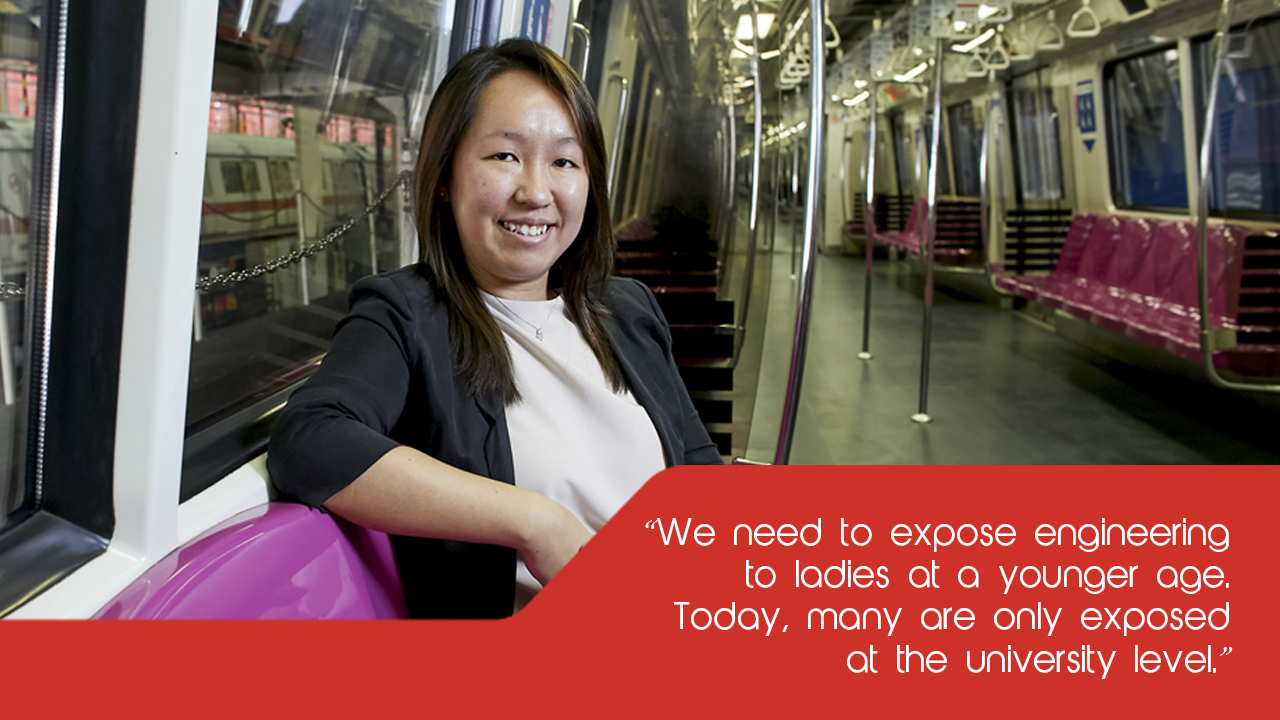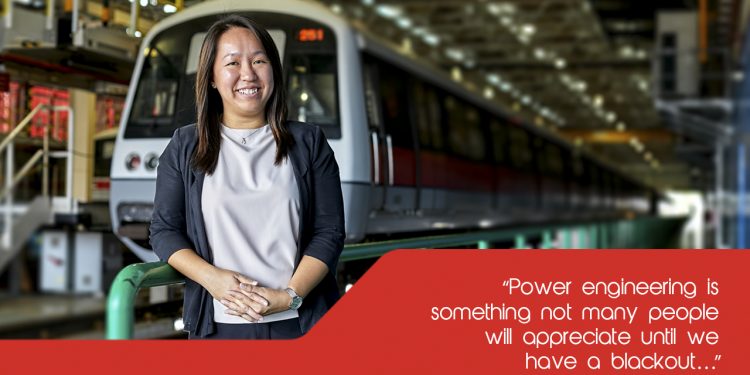Story by Fawwaz Baktee Every day, almost 3 million people in Singapore commute by MRT. But how many of us spare a thought for the hard work an army of engineers and technicians put in behind the scenes to keep the trains running as we head to our destinations? Meet one of these unsung heroes – 33-year-old engineer Edelene Ee. With an electrical engineering degree, Edelene joined SMRT back in 2008 as a management trainee and has since risen through the ranks to become the deputy director of the SMRT power maintenance division. She currently leads a team of 120 power maintenance managers, engineers and technical officers to ensure the safety and reliability of the railway power distribution network encompassing trains and stations.  “I guess power engineering is something not many people will appreciate until we have a blackout and only then will we realise the importance of feeding electricity to the country,” she said. Although her job as an engineer requires her to plan and introduce power engineering processes and technology, Edelene is not afraid of getting out the office to get her hands dirty, and often goes down to the ground with her team. Equal Ability Edelene believes women can do just as well as men in engineering. In fact, she was one of three female engineers to be accredited as a Chartered Engineer (CEng) in Railway and Transportation Engineering in March last year. The accreditation is awarded by the Institution of Engineers, Singapore (IES) and is recognised by the railway industry as an indication of the deep expertise in a specialised field of engineering. She has also upped that this year by recently being officially registered as a Professional Engineer with the prestigious Professional Engineer Board, a statutory board in the Ministry of National Development. “In SMRT, I have supportive colleagues and bosses who don’t treat me differently than any of my engineering counterparts. They don’t have any prejudices against female engineers. Although I’m a female engineer, my bosses guided and gave me equal respect and opportunities as they would any other person doing the job,” she said. Edelene also believes how engineering is portrayed in mainstream society plays a role in deterring women from entering the industry. “It’s often portrayed as being dirty work. You know, you have to always be in the sun and everything. But there are many aspects of engineering. For instance, design engineering has more to do with consultancy in an office setting. It all depends on what route of engineering you get into. So this opinion has to change,” said Edelene. Raise Awareness To improve female participation in the engineering industry, more awareness must be raised on the different types of jobs there are in engineering, she said.
“I guess power engineering is something not many people will appreciate until we have a blackout and only then will we realise the importance of feeding electricity to the country,” she said. Although her job as an engineer requires her to plan and introduce power engineering processes and technology, Edelene is not afraid of getting out the office to get her hands dirty, and often goes down to the ground with her team. Equal Ability Edelene believes women can do just as well as men in engineering. In fact, she was one of three female engineers to be accredited as a Chartered Engineer (CEng) in Railway and Transportation Engineering in March last year. The accreditation is awarded by the Institution of Engineers, Singapore (IES) and is recognised by the railway industry as an indication of the deep expertise in a specialised field of engineering. She has also upped that this year by recently being officially registered as a Professional Engineer with the prestigious Professional Engineer Board, a statutory board in the Ministry of National Development. “In SMRT, I have supportive colleagues and bosses who don’t treat me differently than any of my engineering counterparts. They don’t have any prejudices against female engineers. Although I’m a female engineer, my bosses guided and gave me equal respect and opportunities as they would any other person doing the job,” she said. Edelene also believes how engineering is portrayed in mainstream society plays a role in deterring women from entering the industry. “It’s often portrayed as being dirty work. You know, you have to always be in the sun and everything. But there are many aspects of engineering. For instance, design engineering has more to do with consultancy in an office setting. It all depends on what route of engineering you get into. So this opinion has to change,” said Edelene. Raise Awareness To improve female participation in the engineering industry, more awareness must be raised on the different types of jobs there are in engineering, she said.
 “We need to expose engineering to ladies at a younger age. Today, many are only exposed at the university level. This means only girls who are lucky enough to be exposed to engineering at an early age would opt to study that as their first choice, and those who don’t won’t get to know what engineering is all about. “If exposure is done at the secondary school level, we may see more women opting to study engineering courses in university and make a career out of that.”
“We need to expose engineering to ladies at a younger age. Today, many are only exposed at the university level. This means only girls who are lucky enough to be exposed to engineering at an early age would opt to study that as their first choice, and those who don’t won’t get to know what engineering is all about. “If exposure is done at the secondary school level, we may see more women opting to study engineering courses in university and make a career out of that.”

